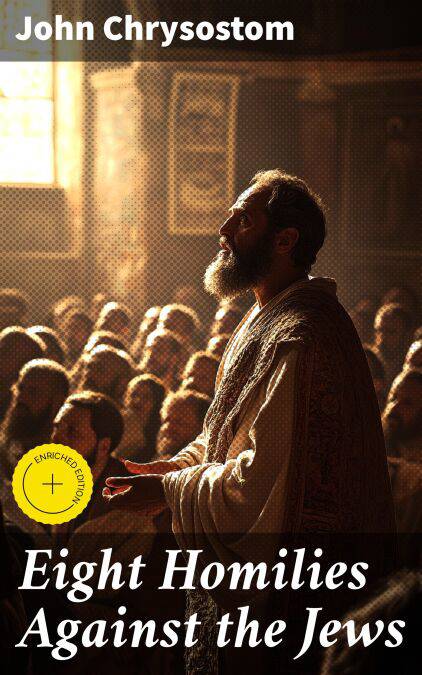
- Afhalen na 1 uur in een winkel met voorraad
- Gratis thuislevering in België vanaf € 30
- Ruim aanbod met 7 miljoen producten
- Afhalen na 1 uur in een winkel met voorraad
- Gratis thuislevering in België vanaf € 30
- Ruim aanbod met 7 miljoen producten
Zoeken
Eight Homilies Against the Jews E-BOOK
Enriched edition. A Theological Critique of Jewish Practices in Early Christianity
John Chrysostom
E-book | Engels
€ 1,99
+ 1 punten
Omschrijving
In "Eight Homilies Against the Jews," John Chrysostom delivers a series of powerful and provocative sermons that reflect the contentious religious and social atmosphere of late 4th-century Antioch. Characterized by passionate rhetoric and theological depth, these homilies examine Jewish religious practices and beliefs while asserting the supremacy of Christianity. Chrysostom's style is both eloquent and incisive, employing scriptural exegesis and vivid imagery to persuade his audience of his views, a testament to his role as one of early Christianity's preeminent orators. Contextually, this work not only highlights the complex dynamics of Jewish-Christian relations but also serves as a pivotal discourse in early Church history, illustrating the tensions that ultimately helped shape early Christian identity. John Chrysostom, known as the "Golden-Mouthed" for his rhetorical prowess, was a central figure in early Christian thought. His background as a priest and later bishop of Constantinople provided him with a profound understanding of ecclesiastical authority and societal issues. His experiences with ecclesiastical politics and pastoral care informed these homilies, reflecting his zeal for doctrinal purity and an unwavering commitment to convincing his contemporaries of the truth of Christianity. Readers interested in early Christian literature and the dynamics of religious discourse will find "Eight Homilies Against the Jews" both challenging and enlightening. It offers insight into the early Church's struggles and the fervent spirit of its leaders, making this book essential for understanding the roots of Christian anti-Judaism.
In this enriched edition, we have carefully created added value for your reading experience:
- A comprehensive Introduction outlines these selected works' unifying features, themes, or stylistic evolutions.
- The Author Biography highlights personal milestones and literary influences that shape the entire body of writing.
- A Historical Context section situates the works in their broader era—social currents, cultural trends, and key events that underpin their creation.
- A concise Synopsis (Selection) offers an accessible overview of the included texts, helping readers navigate plotlines and main ideas without revealing critical twists.
- A unified Analysis examines recurring motifs and stylistic hallmarks across the collection, tying the stories together while spotlighting the different work's strengths.
- Reflection questions inspire deeper contemplation of the author's overarching message, inviting readers to draw connections among different texts and relate them to modern contexts.
- Lastly, our hand‐picked Memorable Quotes distill pivotal lines and turning points, serving as touchstones for the collection's central themes.
In this enriched edition, we have carefully created added value for your reading experience:
- A comprehensive Introduction outlines these selected works' unifying features, themes, or stylistic evolutions.
- The Author Biography highlights personal milestones and literary influences that shape the entire body of writing.
- A Historical Context section situates the works in their broader era—social currents, cultural trends, and key events that underpin their creation.
- A concise Synopsis (Selection) offers an accessible overview of the included texts, helping readers navigate plotlines and main ideas without revealing critical twists.
- A unified Analysis examines recurring motifs and stylistic hallmarks across the collection, tying the stories together while spotlighting the different work's strengths.
- Reflection questions inspire deeper contemplation of the author's overarching message, inviting readers to draw connections among different texts and relate them to modern contexts.
- Lastly, our hand‐picked Memorable Quotes distill pivotal lines and turning points, serving as touchstones for the collection's central themes.
Specificaties
Betrokkenen
- Auteur(s):
- Uitgeverij:
Inhoud
- Aantal bladzijden:
- 162
- Taal:
- Engels
Eigenschappen
- Productcode (EAN):
- 4064066457211
- Verschijningsdatum:
- 10/04/2021
- Uitvoering:
- E-book
- Beveiligd met:
- Digital watermarking
- Formaat:
- ePub

Alleen bij Standaard Boekhandel
+ 1 punten op je klantenkaart van Standaard Boekhandel
Beoordelingen
We publiceren alleen reviews die voldoen aan de voorwaarden voor reviews. Bekijk onze voorwaarden voor reviews.








